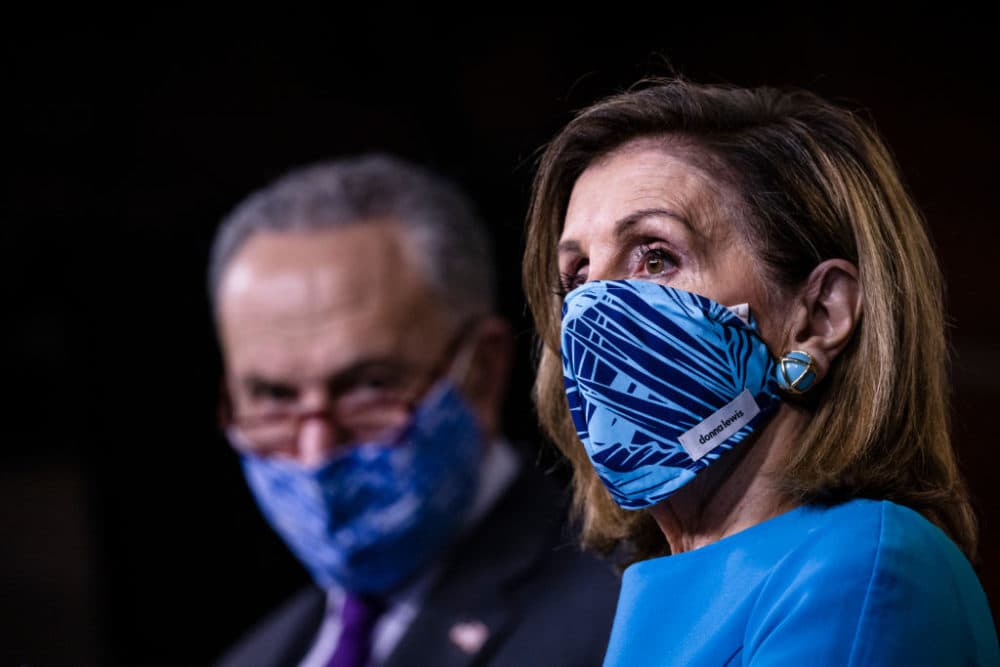Advertisement
Commentary
Censure Won't Remove Trump, But It Would Hold Him Accountable. And Cause Big Problems For Republicans

President Donald Trump’s presidency has been unprecedented in so many ways that it’s unsurprising that it’s ending in a constitutional crisis. While there’s surely not a consensus, it’s clear that most of official Washington, including many Republicans, considers Trump to be unsuited to hold office. The question is what to do about it.
In the midst of a constitutional crisis created by a president inciting a mob to insurrection, it’s logical to ask what constitutional remedies are available to remove that president from office. Unfortunately, the two most likely remedies for a swift exit — impeachment and the 25th Amendment — are toothless, because they are unlikely to occur. Furthermore, their pursuit by Democrats will likely drive moderate Republicans closer to the party’s fringe, at a time when there is a narrow opening for more moderate Republicans to join common cause with the mainstream of the Democratic Party — at least on the question of supporting the rule of law and democratic principles.
Since neither impeachment nor the 25th Amendment is likely to succeed in removing Trump from office, the constitutional remedy is waiting it out, until his term expires at noon on January 20. And that’s hardly acting to channel intense political energy in a pro-democracy direction.
Impeachment will likely fail because of the two-thirds requirement to convict in the U.S. Senate. To achieve this will require anti-nationalist conservatives to vote to convict. Lindsay Graham of South Carolina, who fits the bill, has called impeachment “dangerous.” The more moderate Chuck Grassley of Iowa has sent signals that he does not consider Trump’s actions impeachable.
Mitt Romney of Utah, who has already supported Trump’s impeachment once, and Lisa Murkowski of Alaska, who has called on Trump to resign, might be brought along, but that is a long way from the 14 other Republican senators who would have to be convinced. The landscape won’t change when the Senate moves formally into Democratic hands on January 20 when Kamala Harris becomes vice president. Hopes for a post-inauguration impeachment and conviction are dim.
A resolution that censures Donald Trump for inciting the invasion of the Capitol ... would help label opponents as enemies of the Constitution.
The 25th Amendment route will likely fail, too, because of the lack of support among a collection of cabinet officials who owe their offices to Trump. Vice President Pence, who must be on board for the amendment to operate, has already expressed opposition to invoking it, although he has left the door open if Trump becomes more unstable.
If these two constitutional remedies are toothless, what is Congress to do? One option is congressional censure.
Faced with the reality that Donald Trump will remain president for the next nine days, Congress has an opportunity to influence the course of political events over the next several months. This is through using the business on the floor of the two chambers to make clear the divide between mainstream conservatives in the Republican Party, who will come to the defense of democratic principles, and the far-right, who won’t.
A resolution that censures Donald Trump for inciting the invasion of the Capitol building would likely be supported by large numbers of Republicans in both chambers. The vote would help label opponents as enemies of the Constitution. In many congressional districts, it would provide a critical theme for opponents in the 2022 midterm, both in the primary and general election.

Censure in Congress is rare. The best-known case in history is that of Joseph McCarthy in 1954, which is often credited with putting to an end to the communist witch-hunt that McCarthy unleashed.
Censuring President Trump carries risks, for sure. A big one is that some censure opponents will wear their nay votes as badges of honor. If they are re-elected, it will be regarded as a vindication of President Trump’s recklessness.
A recent poll by YouGov reveals that the Republican Party is divided down the middle on the question of supporting the storming of the Capitol building and blaming it on Trump. This certainly supports the view that a censure vote carries risks of further unifying the radical right within the party, but it also supports the view that the party is potentially cleaved on the question.
The recent runoff in Georgia illustrates the medium- and long-term risks to the Republican Party of being seen as embracing fringe insurrectionist elements. There are parts of the country where conservative values dominate, and yet enough moderate conservatives will sit out congressional elections or even support Democratic candidates that electoral outcomes could be changed.
... which Republicans will come to the defense of federalism, the separation of powers, the rule of law and other core constitutional values.
The congressional votes on overturning the legitimate elections in Arizona and Pennsylvania — taken just hours after the bloody invasion had been stopped — have resulted in one marker being put down over which Republicans will come to the defense of federalism, the separation of powers, the rule of law and other core constitutional values. A vote to censure President Trump for inciting insurrection would be a second.
Our current situation is fluid. If Trump makes further incendiary remarks, and those remarks are accompanied by more violence akin to what we witnessed last Wednesday, the willingness of Republicans to cooperate in the constitutional removal of Trump from office could change. But at this moment — given our current political realities — congressional censure is a step we can actually take.
It will no doubt be viewed by many as a slap on the wrist, out of proportion to the horror that overtook the capital on January 6. To a large degree, that’s correct.
However, if the more consequential avenues of swift removal by constitutional means will be for naught, pursuing them will be even less than a wrist slap. Trump will have escaped the clutches of his political enemies yet again, and only grow in stature among the radical right. Dealing with the present constitutional crisis requires more than removing Donald Trump from office. It requires creating the conditions for electoral politics to marginalize opponents of constitutional government.
